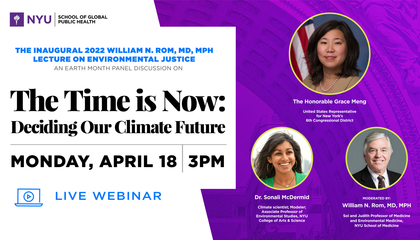To commemorate Earth Day, GPH held its inaugural William N. Rom, MD, MPH Lecture on Environmental Justice entitled “The Time is Now: Deciding Our Climate Future,” with a discussion of environmental justice and the trajectory of climate change. Featured guests were the U.S. Representative from Queens, NY, Grace Meng, and climate scientist Dr. Sonali McDermid from NYU’s College of Arts and Science.
Congresswoman Meng opened the conversation with a stark look at the reality of where our world is today in the climate crisis. Representing New York’s 6th Congressional District, she is an advocate for protecting wildlife and sustainability for future generations.
“The nations of the world are on a rollercoaster,” she said, “riding up to the apex before the drop. Imagine there’s a sign at the top, but you cannot easily read it. But as you get closer, you can read that it says ‘The Point of No Return.’ That, folks, is what we’re seeing today as we look to 2025.”
Congresswoman Meng noted that the Biden Administration has committed to reducing greenhouse gas emissions to reach net-zero emissions by 2050. She also discussed her role as a member of the House Appropriations Committee that oversees federal funding for climate initiatives like those outlined in President Biden’s Build Back Better plan.
Professor McDermid joined in by discussing how affordable, accessible and sustainable alternatives are the key to reaching our national environmental goals. She added, “We need to consider how to bring about these affordable technologies, how to scale them on the manufacturing side of things, and how to marry them with opportunities” in dense communities like New York City.
Professor Rom and Dr. McDermid then discussed the future of a climate-conscious society where energy efficiency is the standard. Professor Rom provided context into how the transportation industry is pivoting to incorporate sustainability into product practices.
He explained, “Virtually all of the automotive companies have declared 2035 or 2040 -- or even 2030 -- as a time by which they're going to electrify their entire fleets. So we now have a challenge of getting charging stations distributed along highways, and certainly in cities, to meet this demand for electric vehicles.”
Not only will a more climate-conscious society impact life on the environmental front, but Dr. McDermid also drew attention to how producing more options will have a social and cultural impact on our world. For instance, chemicals like methane and nitrous oxide are already in the foods we consume every day. If climate change is not addressed, there’s also the threat of a limit on crop production for populations by the year 2050, as was discussed by Professor Rom and Dr. McDermid.
In closing, Dr. McDermid emphasized how public pressure on big banks and corporations is instrumental in the fight for our planet. “In addition to regulation, we need ways to keep track of these companies, and to figure out who needs to be held accountable publicly, and other leverage points that can constrain how these corporate entities act.” She added, “All of that is extremely unpopular, for a host of reasons, particularly in the United States, but if we’re serious about the climate crisis then these are ideas we have to entertain.”
